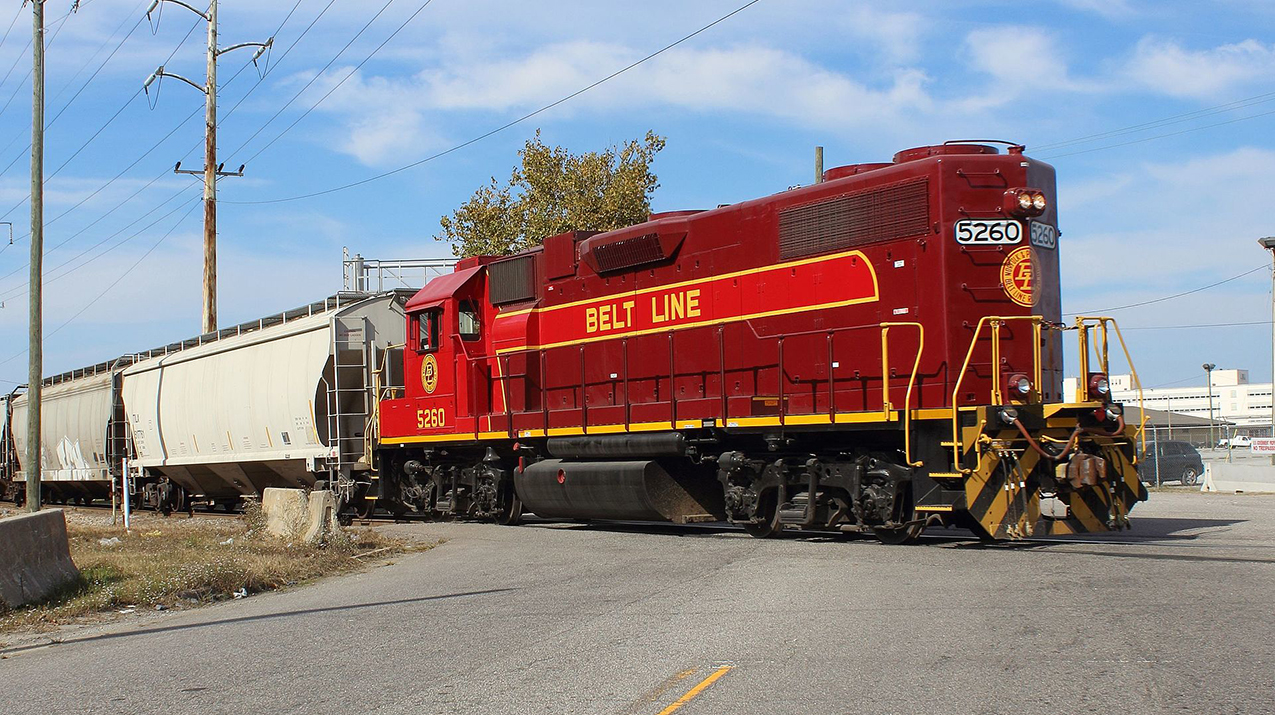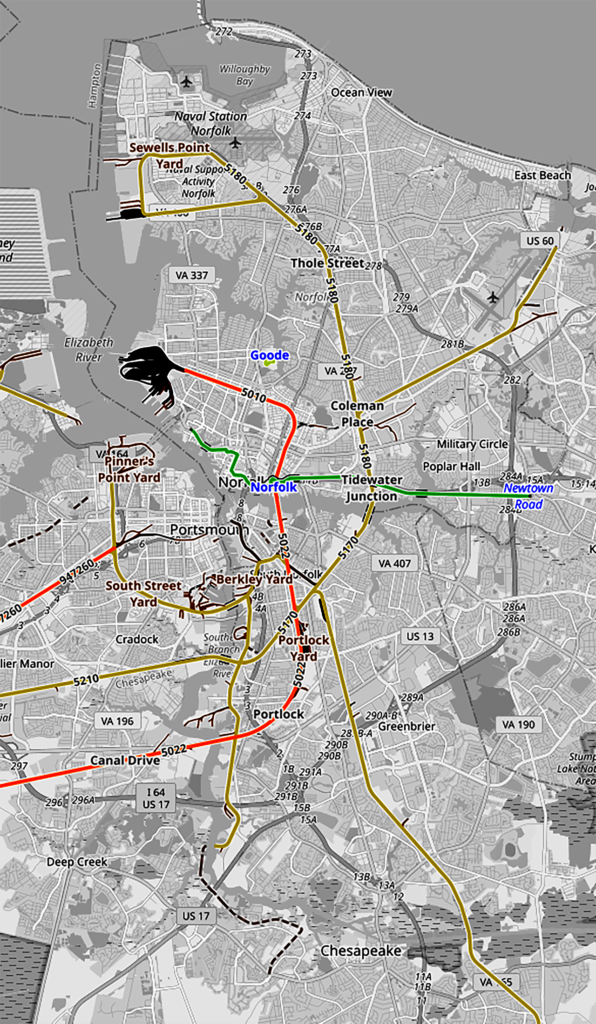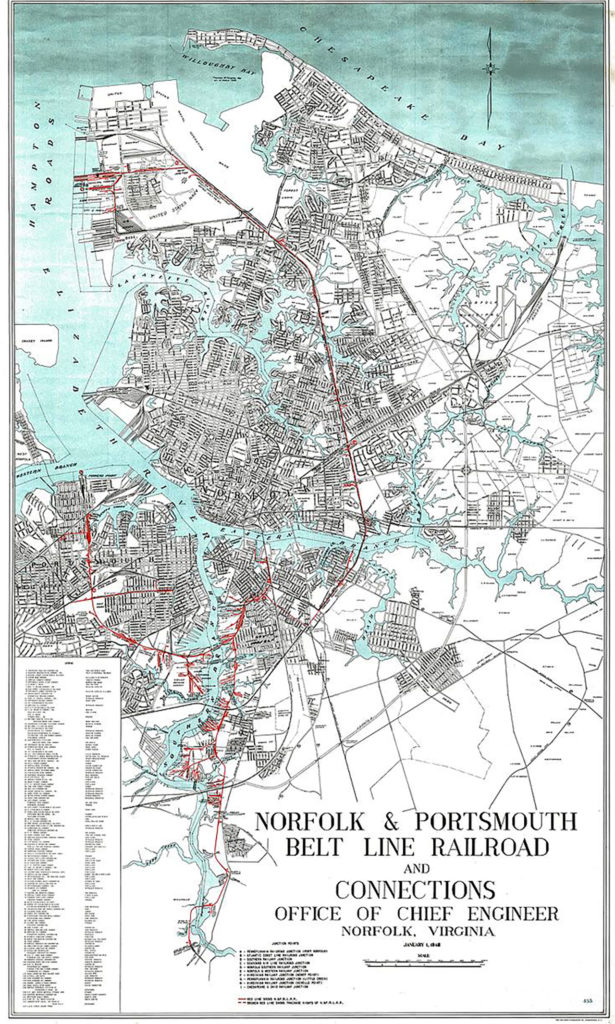
Report: SCOTUS Passes on NS vs. STB Suit
Written by William C. Vantuono, Editor-in-Chief
Norfolk & Portsmouth Belt Line Railroad #5260 crossing Elm Ave., Portsmouth, Va., at U.S. Norfolk Naval Shipyard. 5260 is painted a commemorative scheme as part of the Norfolk Southern Heritage Program. Photographer: David E. George III/Wikimedia Commons
The U.S. Supreme Court (SCOTUS) declined April 15 to hear Norfolk Southern’s challenge to a 2022 Surface Transportation Board ruling (Norfolk Southern Railway Co. v. Surface Transportation Board et al., case number 23-577, in the Supreme Court of the United States) that NS cannot control Virginia’s Norfolk & Portsmouth Belt Line Railroad Co. (NPBL), subject of a 2018 antitrust suit from CSX over rate setting, Law360’s Jared Foretek has reported.
SCOTUS “denied Norfolk Southern’s petition for review, leaving untouched the D.C. Circuit’s decision to uphold the STB’s finding,” Law360 reported. “As is typical, the justices did not include reasoning for their denial of the petition. Norfolk Southern had argued that it has the authority to control use of the 26-mile corridor through its majority shares in the Norfolk & Portsmouth Belt Line Railroad Co., and should be immune from CSX’s 2018 suit.”
NS told SCOTUS in a November 2023 petition that “rates it sets on the Belt Line—which CSX called ‘prohibitively expensive’ in its complaint—fall under an STB antitrust exemption for transactions ‘within a corporate family that do not result in adverse changes in service level,’ Law360 noted. “Norfolk Southern also argued that a D.C. Circuit decision to uphold the STB’s finding in June [2023] created a circuit split over which courts have jurisdiction over certain STB decisions.
“The STB and CSX each asked the Supreme Court to reject Norfolk Southern’s petition, with the former calling the dispute a ‘factbound issue’ and pointing out that, despite its claims of a circuit split, Norfolk Southern actually agreed with the jurisdictional determination the D.C. Circuit made when it upheld the STB finding. Norfolk Southern claimed in its petition that the STB’s 2022 finding was a reversal from 1998, when it said the Board authorized Norfolk Southern’s control seven years after a 1991 Interstate Commerce Commission said the same.
“‘The ICC and STB approved Norfolk Southern’s control over the Belt Line, And that should come as no surprise to CSX …, a Norfolk Southern competitor that owns the remaining 42.86% of the Belt Line’s shares and has long ‘acknowledg[ed] and accept[ed] [Norfolk Southern’s] majority ownership and control’” of the Belt Line, [NS] wrote. But in its response brief, the Board claimed that it never authorized a ‘corporate-family’ exemption for Norfolk Southern’s control over the Belt Line. Instead, the STB told the justices, it had cleared a much narrower corporate restructuring.
“‘The Board issued an order [in 2022] holding that the ICC had not authorized petitioner’s corporate family to acquire control over the Belt Line in 1982, and further holding that the ICC and Board had not authorized the corporate family to acquire control over the Belt Line when the agencies approved the 1991 and 1998 internal corporate reorganizations,’ the STB wrote.”
CSX alleges in its suit that NS “has been using the fees to squeeze CSX out from the Belt Line, a key [Class III Switching & Terminal railroad] for interchanging cars between lines and accessing the Norfolk International Terminals at the Port of Virginia,” Law360 reported. “That proceeding was put on hold when the district court asked for the STB’s opinion on the control issue. But after the Board’s finding, the lower court still granted summary judgment in favor of Norfolk Southern, writing that CSX lacked evidence that it ‘was actually damaged’ by Norfolk Southern’s fees and holding that the plaintiff was barred by the statute of limitations. CSX is appealing to the Fourth Circuit.”
CSX said in its February 2024 SCOTUS filing “that there were no substantive legal questions raised by Norfolk Southern in its appeal of the STB’s decision,” Law360 noted. “As for the merits of the board’s order, which is Norfolk Southern’s real concern, there is no conflict in the circuits on the narrow and technical question presented, which has not been considered by any other court of appeals,” CSX said.

A Class III S&T incorporated in the Commonwealth of Virginia as the Southeastern & Atlantic Railroad Company in 1896, NPBL is owned 57% by Norfolk Southern and 43% by CSX. It currently owns 26 route-miles (36 track-miles) and operates 27 route-miles under trackage rights in the Hampton Roads communities of Norfolk, Portsmouth and Chesapeake, Va. NPBL adopted its current corporate name in 1898 and acquired and absorbed the Elizabeth River Railroad in 1910. It was originally formed by Norfolk & Western, Chesapeake & Ohio, Southern Railway Co., New York, Philadelphia & Norfolk, Atlantic & Danville Railway, Atlantic Coast Line, Norfolk Southern Railway (1942–1982), and Seaboard Air Line. NPBL interchanges with Chesapeake & Albemarle Railroad, CSX and NS. NPBL serves 24 marine terminals and industries, linking the deepwater port from Sewells Point to Portsmouth Marine Terminal, including the Southern Branch Elizabeth River. It operates one main classification yard located in the South Norfolk area of Chesapeake, where its headquarters, T&E and maintenance-of-way facilities are also located.




